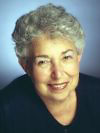Issue Archive
President’s Column: Let Stem Cells Flower
 Sometimes, especially when trying on new clothes, it’s hard to believe that we human beings begin our existence as a single microscopic cell. That first cell reproduces with exuberance and, in the process, cells begin taking on new identities. Some become bone cells, others liver cells and still others brain cells. Scientists long supposed that if they could roll back to square-one—that is, cell one, before it differentiated—they might be able to produce specialized healthy cells to replace disease-causing ones. Seven short years ago few had heard of stem cells. That’s when the first research teams in America isolated them and opened up this promising avenue of exploration that we hope will eventually cure many diseases.
Sometimes, especially when trying on new clothes, it’s hard to believe that we human beings begin our existence as a single microscopic cell. That first cell reproduces with exuberance and, in the process, cells begin taking on new identities. Some become bone cells, others liver cells and still others brain cells. Scientists long supposed that if they could roll back to square-one—that is, cell one, before it differentiated—they might be able to produce specialized healthy cells to replace disease-causing ones. Seven short years ago few had heard of stem cells. That’s when the first research teams in America isolated them and opened up this promising avenue of exploration that we hope will eventually cure many diseases.
New sciences frequently prompt ethical debate. We do not have to go back to Galileo’s persecution for advancing Copernicus’s idea that the planets revolve around the sun. Many of us recall the conflict over in vitro fertilization in the 1970’s, when we heard that some babies would come out of test tubes and not from their mothers’ wombs. Today, more than 100,000 babies have been born with the help of IVF in the United States alone. Many childless couples have become happy parents.
What makes stem cells such an issue for us at Hadassah, and for me personally, is concern about crossing a critical line in which political regulation inhibits the spirit of free inquiry so essential for science. Last year, at our national convention in Phoenix, we made more than a thousand phone calls to Washington, expressing our opinions as American citizens that stem cell research should not be curtailed. I was proud to be the first caller. In the first week of March, we will step up this campaign with the State of Stem Cells March on State Capitols all over America. We want to educate elected officials about the importance of stem cell investigation and to advocate for legislation that advances this research.
As always, it is instructive to see how such dilemmas are resolved in Israel, and particularly in our Hadassah Medical Organization, where more than half of the nation’s hospital-based research is conducted. In Israel, ethical issues are confronted at the beginning of each new scientific inquiry. From the start, scientists were given the go-ahead for research using stem cells taken from spare test-tube fertilizations that would never be used. Judaism has no problem with technology per se, and laboratory stem cells aren’t accorded the sanctity of human life. Nonetheless, researchers only get permission to use them if they are working on genuine medical challenges. This is tikkun olam in the truest sense.
HMO, working with Monash University in Australia and the National University of Singapore, was the second group in the world to derive stem cells. At least five of the twelve permitted stem cell lines that are available for U.S. federal funding come from this source.
Two Hadassah physicians, gynecologist Benny Reubinoff and neurologist Tamir Ben-Hur, recently reported on progress in their research. Both are graduates of our medical school. In a world first, they primed human stem cells to the point where they were about to become nerve cells, and then implanted them in lab rats suffering from a Parkinson’s-like condition. The rats’ health improved. Will the same work for humans? We don’t know. The journey ahead is long, but the stage is set for a future in which stem cells may ultimately be used to treat Parkinson’s disease. We applaud our doctor-scientists at the forefront of international research.
The gratification we feel from Israeli research notwithstanding, federal funding from the United States is permitted only on the 12 stem cell lines that existed in 2001. We’re counting on states to follow California’s lead in funding stem cell research, and we’re counting on Hadassah women to let legislators know what we think. Education and exploration of new ideas are the hallmark of our people, in Israel and the diaspora. It’s up to every one of us as Americans to stand up for those values and, as citizens, to sound our voices for freedom of inquiry.










 Facebook
Facebook Instagram
Instagram Twitter
Twitter
Leave a Reply